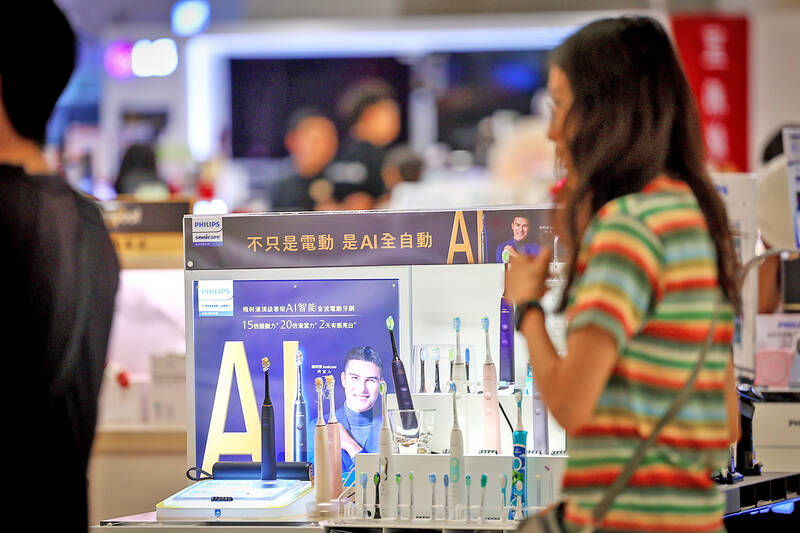The government’s business climate monitor last month flashed “yellow-red” for the second straight month as robust artificial intelligence (AI) demand from abroad continued to bolster industrial output and machinery imports, the National Development Council (NDC) said yesterday.
The monitor’s score stayed unchanged at 35, indicating that the nation’s economy is maintaining momentum, due to rising exports, industrial production and imports of electrical and machinery equipment, it said.
The council uses a five-color spectrum to indicate the nation’s economic health, with “red” suggesting a boom, “green” indicating steady growth and “blue” signifying recession. Dual colors mean the economy is transitioning to a stronger or worse state.

Photo: CNA
“The recovery appears less imbalanced with more sectors coming out of the woods,” council research director Wu Ming-huei (吳明蕙) told a media briefing in Taipei.
Taiwan’s export-oriented economy has benefited from strong demand for AI investment by US technology giants, Wu said.
Firms in the global AI supply chain appeared sturdy, while non-tech firms gradually emerged from inventory adjustments, the official said.
However, manufacturers of chemical, plastic and steel products remained affected by sharp competition from Chinese rivals and Beijing’s termination of favorable tax terms under the Economic Cooperation Framework Agreement, Wu said.
“There is little the Taiwanese government can do on this issue, which carries more political than economic implications,” the official said.
The index of leading indicators, which seeks to project the economic landscape in the next six months, increased 0.87 percent from one month earlier to 103.4, rising for the eighth month in a row, the council said.
All seven component measures displayed upward cyclical movements, consistent with Taiwan’s economic improvement, it added.
The index of coincident indicators, which reflects the current economic situation, increased 1.16 percent to 104.1, rising for the 14th consecutive month, the council said.
Almost all of the seven sub-indices gained points except the reading on the value of exports which weakened slightly from one month earlier.
The council is positive about the economic outlook, as local tech firms maintain leading positions in chipmaking and would show stronger interest in capacity expansion to meet customer needs, the council said.
However, Wu said firms should remain wary about monetary policy by major central banks and volatile geopolitical relationships, as the two factors would affect global trade and therefore, Taiwan’s exports.
In a related development, the consumer confidence index this month was 72.69, rising by an insignificant 0.49 point from last month, indicating a neutral assessment, a survey by National Central University (NCU) showed yesterday.
Of the six components in the index, the confidence reading on stock investment bucked the uptrend and shed 0.97 points to 58.38, as profit-taking pressure built up after the TAIEX rallied to new highs repeatedly, it said.
Dachrahn Wu (吳大任), director of NCU’s Research Center for Taiwan Economic Development, which conducted the survey, said that investors should be cautious, as the US economy, which is the primary end-market for consumer electronic gadgets, might be losing momentum given lackluster consumer spending.

The US dollar was trading at NT$29.7 at 10am today on the Taipei Foreign Exchange, as the New Taiwan dollar gained NT$1.364 from the previous close last week. The NT dollar continued to rise today, after surging 3.07 percent on Friday. After opening at NT$30.91, the NT dollar gained more than NT$1 in just 15 minutes, briefly passing the NT$30 mark. Before the US Department of the Treasury's semi-annual currency report came out, expectations that the NT dollar would keep rising were already building. The NT dollar on Friday closed at NT$31.064, up by NT$0.953 — a 3.07 percent single-day gain. Today,

‘SHORT TERM’: The local currency would likely remain strong in the near term, driven by anticipated US trade pressure, capital inflows and expectations of a US Fed rate cut The US dollar is expected to fall below NT$30 in the near term, as traders anticipate increased pressure from Washington for Taiwan to allow the New Taiwan dollar to appreciate, Cathay United Bank (國泰世華銀行) chief economist Lin Chi-chao (林啟超) said. Following a sharp drop in the greenback against the NT dollar on Friday, Lin told the Central News Agency that the local currency is likely to remain strong in the short term, driven in part by market psychology surrounding anticipated US policy pressure. On Friday, the US dollar fell NT$0.953, or 3.07 percent, closing at NT$31.064 — its lowest level since Jan.

The New Taiwan dollar and Taiwanese stocks surged on signs that trade tensions between the world’s top two economies might start easing and as US tech earnings boosted the outlook of the nation’s semiconductor exports. The NT dollar strengthened as much as 3.8 percent versus the US dollar to 30.815, the biggest intraday gain since January 2011, closing at NT$31.064. The benchmark TAIEX jumped 2.73 percent to outperform the region’s equity gauges. Outlook for global trade improved after China said it is assessing possible trade talks with the US, providing a boost for the nation’s currency and shares. As the NT dollar

The Financial Supervisory Commission (FSC) yesterday met with some of the nation’s largest insurance companies as a skyrocketing New Taiwan dollar piles pressure on their hundreds of billions of dollars in US bond investments. The commission has asked some life insurance firms, among the biggest Asian holders of US debt, to discuss how the rapidly strengthening NT dollar has impacted their operations, people familiar with the matter said. The meeting took place as the NT dollar jumped as much as 5 percent yesterday, its biggest intraday gain in more than three decades. The local currency surged as exporters rushed to